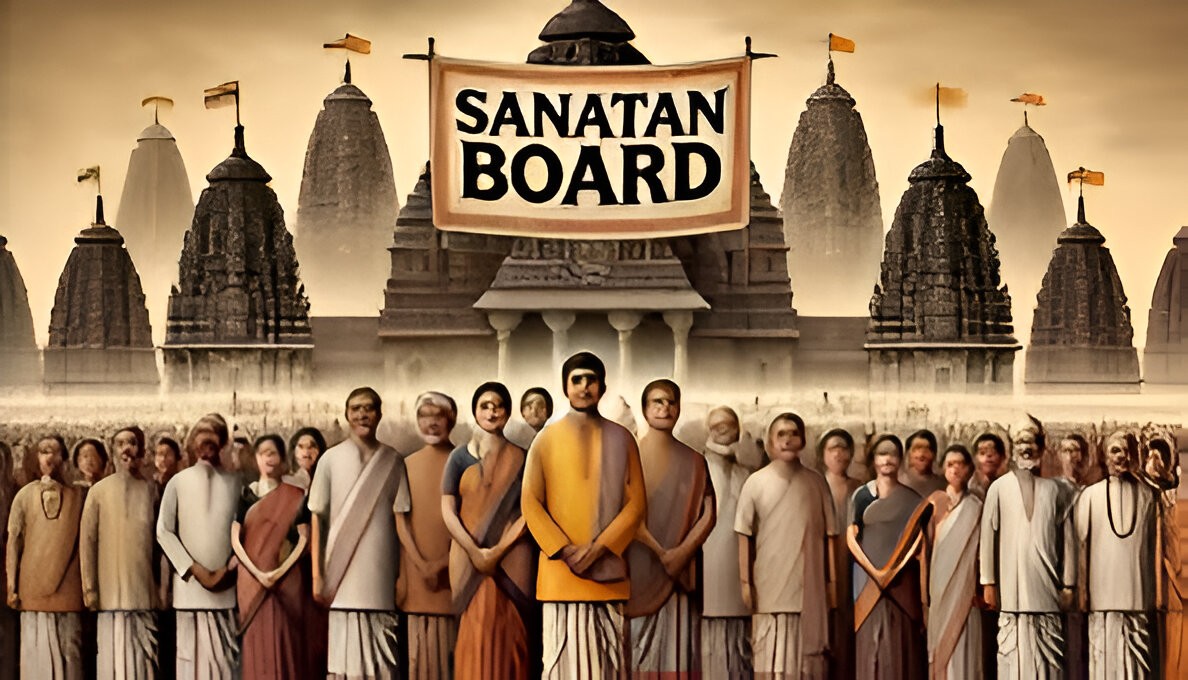Mar 21, 2025


INDIA EDITION
Sanatan Board: A Game-Changer for Temples?
As demand of Sanatan Board increases, supporters argue it’s time for Hindu temples to have the same oversight as the Waqf Board, sparking debate on religious autonomy and governance.
untapped
Written By
Zara Fernandes
Published


India is a home to approximately 1.1 billion Hindus! That means about 94% of the total global Hindu population resides in this country alone. With an estimated 650,000 temples across the country, the demand for a dedicated regulatory body to oversee and safeguard Hindu religious institutions has never been stronger.
The Sanatan Board: A Vision for Temple Autonomy
The Sanatan Board is a proposed organization spearheaded by renowned Hindu storyteller Devkinandan and backed by several prominent spiritual leaders, aims to protect and manage the properties of Hindu religious institutions. Devkinandan, a leading voice behind the movement, has emphasized the importance of empowering Hindu religious bodies to oversee their own affairs rather than leaving it up to government control.
According to him, the current system of government oversight has hindered the proper functioning of temples. Scholar Pawan Sinha has also emphasized the need for financial autonomy for temples, stressing that the funds collected within temple premises should be used for their maintenance. He pointed out that under the current system, even poojaris and sweepers are often left unpaid, highlighting the urgent need for a change in how temple finances are managed.
Calls for Equal Representation in Religious Administration
Supporters of the Sanatan Board argue that the initiative is long overdue, pointing out to the fact that Muslim community already has a board for this purpose - the Waqf Board, which oversees Muslim religious properties in India.
They contend that if such a system is in place for the Muslim community, Hindus too should have a dedicated body to manage their religious institutions. One supporter raised the question, “If there is a Waqf Board, why don’t we have a Sanatan Board?” highlighting what they see as a significant disparity in religious oversight.
Addressing concerns of mismanagement
The Waqf Board has recently come under scrutiny over allegations of illegally acquiring government land. However, many supporters argue that the situation will be different moving forward. Uttar Pradesh Chief Minister Yogi Adityanath commented on the issue, stating, “Sanatan Dharma goes higher than the skies; its depth is deeper than the deepest oceans. Please don’t compare it with any religion or ideology. We can’t compare ourselves to those who use the Waqf Board to create a land mafia. It’s an insult to Sanatan.” In fact the many individuals are pushing for the removal of the waqf Board due to their recent controversies and encouraging the creation of the Santan board.
Public Response: Support and Opposition to the Sanatan Board
The creation of the Santan board has mostly brought about a positive response from the public. Abhishek Agarwal(film producer tweeted “Sanatan Board is the need of the hour and must be formed with constitutional recognition. Without it, the Waqf Board will swallow India's lands” while endorsing the establishment of this board. Another user echoed similar sentiments “They need Waqf to capture temple lands. But Hindus can't claim their places of worship. If the govt doesn't repeal places of worship act then Hindus need Sanatan board in line with Waqf board and Sanatan tribunal.”
However, not all responses are in favor of the proposal. Rithu Rathaur cautioned, “Please Beware Hindus! It seems, a serious attempt by sanghis to take control of temples themselves in the name of temple freedom. It's a Farce!” signaling concerns about the centralization of power of the religious authorities if the proposal is passed.
Niranjani Akhara and Mahant of Ujjain's Arji Hanuman Ji Temple, Swami Premanand Puri, said, "Some claim that the land of the Ganga belongs to the Waqf Board. We must clarify that Sanatan Dharma has existed since the emergence of the Sun. To preserve the nation's integrity, the establishment of the Sanatan Board is crucial."
Swami Balankanananda Giri Maharaj, Peethadhishwar of Anand Akhara, declared, "Wherever there is faith, there is Sanatan. If you don't believe it, dig deeper, and you'll find Sanatan at the root. To safeguard the Sanatan Dharma, the formation of the Sanatan Board is essential."
Akhil Bharatiya Akhada Parishad President Mahant Ravindra Puri said, "The constitution draft of the Sanatan Board will be finalised and officially announced at the Dharma Sabha on January 27 in the presence of all religious leaders."
What’s Next for the Sanatan Board? Will It Spark a New Era of Self-Governance?
The draft of the Sanatan Board will be finalized and officially announced at the Dharma Sabha on January 27 at Maha kumbh in the presence of all religious leaders. this day will be commemorated as "Dharm ki swatantrata ka diwas". As this significant step unfolds, the question remains: Will the formation of the Sanatan Board empower Hindu religious institutions, or will it fuel further polarization in an already divided society? And as the draft takes shape, could giving power to religious authorities lead to a new era of self-governance, or will it spark controversy much like the Waqf Board did? Only time will tell.
INDIA EDITION
Friday, March 21, 2025

Sanatan Board: A Game-Changer for Temples?
As demand of Sanatan Board increases, supporters argue it’s time for Hindu temples to have the same oversight as the Waqf Board, sparking debate on religious autonomy and governance.
Written By
Zara Fernandes
Jan 25, 2025
Published

India is a home to approximately 1.1 billion Hindus! That means about 94% of the total global Hindu population resides in this country alone. With an estimated 650,000 temples across the country, the demand for a dedicated regulatory body to oversee and safeguard Hindu religious institutions has never been stronger.
The Sanatan Board: A Vision for Temple Autonomy
The Sanatan Board is a proposed organization spearheaded by renowned Hindu storyteller Devkinandan and backed by several prominent spiritual leaders, aims to protect and manage the properties of Hindu religious institutions. Devkinandan, a leading voice behind the movement, has emphasized the importance of empowering Hindu religious bodies to oversee their own affairs rather than leaving it up to government control.
According to him, the current system of government oversight has hindered the proper functioning of temples. Scholar Pawan Sinha has also emphasized the need for financial autonomy for temples, stressing that the funds collected within temple premises should be used for their maintenance. He pointed out that under the current system, even poojaris and sweepers are often left unpaid, highlighting the urgent need for a change in how temple finances are managed.
Calls for Equal Representation in Religious Administration
Supporters of the Sanatan Board argue that the initiative is long overdue, pointing out to the fact that Muslim community already has a board for this purpose - the Waqf Board, which oversees Muslim religious properties in India.
They contend that if such a system is in place for the Muslim community, Hindus too should have a dedicated body to manage their religious institutions. One supporter raised the question, “If there is a Waqf Board, why don’t we have a Sanatan Board?” highlighting what they see as a significant disparity in religious oversight.
Addressing concerns of mismanagement
The Waqf Board has recently come under scrutiny over allegations of illegally acquiring government land. However, many supporters argue that the situation will be different moving forward. Uttar Pradesh Chief Minister Yogi Adityanath commented on the issue, stating, “Sanatan Dharma goes higher than the skies; its depth is deeper than the deepest oceans. Please don’t compare it with any religion or ideology. We can’t compare ourselves to those who use the Waqf Board to create a land mafia. It’s an insult to Sanatan.” In fact the many individuals are pushing for the removal of the waqf Board due to their recent controversies and encouraging the creation of the Santan board.
Public Response: Support and Opposition to the Sanatan Board
The creation of the Santan board has mostly brought about a positive response from the public. Abhishek Agarwal(film producer tweeted “Sanatan Board is the need of the hour and must be formed with constitutional recognition. Without it, the Waqf Board will swallow India's lands” while endorsing the establishment of this board. Another user echoed similar sentiments “They need Waqf to capture temple lands. But Hindus can't claim their places of worship. If the govt doesn't repeal places of worship act then Hindus need Sanatan board in line with Waqf board and Sanatan tribunal.”
However, not all responses are in favor of the proposal. Rithu Rathaur cautioned, “Please Beware Hindus! It seems, a serious attempt by sanghis to take control of temples themselves in the name of temple freedom. It's a Farce!” signaling concerns about the centralization of power of the religious authorities if the proposal is passed.
Niranjani Akhara and Mahant of Ujjain's Arji Hanuman Ji Temple, Swami Premanand Puri, said, "Some claim that the land of the Ganga belongs to the Waqf Board. We must clarify that Sanatan Dharma has existed since the emergence of the Sun. To preserve the nation's integrity, the establishment of the Sanatan Board is crucial."
Swami Balankanananda Giri Maharaj, Peethadhishwar of Anand Akhara, declared, "Wherever there is faith, there is Sanatan. If you don't believe it, dig deeper, and you'll find Sanatan at the root. To safeguard the Sanatan Dharma, the formation of the Sanatan Board is essential."
Akhil Bharatiya Akhada Parishad President Mahant Ravindra Puri said, "The constitution draft of the Sanatan Board will be finalised and officially announced at the Dharma Sabha on January 27 in the presence of all religious leaders."
What’s Next for the Sanatan Board? Will It Spark a New Era of Self-Governance?
The draft of the Sanatan Board will be finalized and officially announced at the Dharma Sabha on January 27 at Maha kumbh in the presence of all religious leaders. this day will be commemorated as "Dharm ki swatantrata ka diwas". As this significant step unfolds, the question remains: Will the formation of the Sanatan Board empower Hindu religious institutions, or will it fuel further polarization in an already divided society? And as the draft takes shape, could giving power to religious authorities lead to a new era of self-governance, or will it spark controversy much like the Waqf Board did? Only time will tell.

INDIA EDITION
TRENDING
Indian Scholar Detained in US Over Alleged Antisemitism and Hamas Links
Nasa found a planet made out of diamonds!
Kedarnath Controversy: BJP MLA Calls for Ban on "Non-Hindus" Amid Yatra Management Concerns
Rajasthan Police Skip Post-Holi Festivities in Protest Against Unmet Demands
Tantrik Hangs Six-Month Old Upside Down Over Fire
UNTAPPED
WORK WITH US
FOLLOW US
CONNECT WITH US




theindiaedition0@gmail.com
(+91) 8085014933

INDIA EDITION
TRENDING
Indian Scholar Detained in US Over Alleged Antisemitism and Hamas Links
Nasa found a planet made out of diamonds!
Kedarnath Controversy: BJP MLA Calls for Ban on "Non-Hindus" Amid Yatra Management Concerns
Rajasthan Police Skip Post-Holi Festivities in Protest Against Unmet Demands
Tantrik Hangs Six-Month Old Upside Down Over Fire
UNTAPPED
WORK WITH US
FOLLOW US
CONNECT WITH US




theindiaedition0@gmail.com
(+91) 8085014933